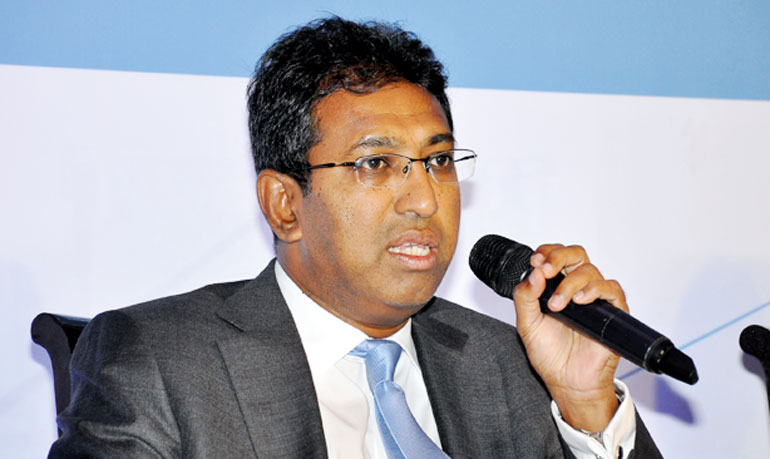Harsha tells private sector to put up or shut up about bribery




Economic Affairs Deputy Minister Dr. Harsha de Silva
 By Charumini de Silva-Thursday, 27 July 2017
By Charumini de Silva-Thursday, 27 July 2017Economic Development Deputy Minister Dr. Harsha De Silva yesterday hushed a packed audience at the Sri Lanka Economic Summit 2017, calling on the private sector to refrain from pointing fingers at corrupt systems unless they were serious about putting a stop to bribery from the bottom right up to the top at Government agencies by not indulging in the practice to get their work done.
“I want people here who have not paid a bribe to any government agency to get a job done. Stand up. If you cannot stand up, shut up! If you are serious on corruption, then don’t do it again. If you are going around and paying your local government people to get your plan passed, what kind of b******t are you coming and telling me here?” he said.
“You have to be serious about this. If you are not serious, don’t just point fingers. It is easy to point fingers and it is difficult not to pay that bribe. So before we talk about corruption again let us not corrupt ourselves,” he claimed.
Dr. De Silva emphasised that Sri Lanka was poor because people were corrupt.
“When I ask my friends ‘why did you do that?’ (pay a bribe) they say, it is a lot of time. I have a job, I am a doctor, lawyer, engineer, I need to get it done. I need to pay. So it is justified. From the bottom to the top if it is justified then do not turn around and say how we are going to take this country out of corruption because you are part of that corruption,” he added.
“I may be not be very popular for saying these things but this is the truth my friend,” he stated.
When Dr. De Silva was asked to consider the low salaries paid to many employers, he said: “If it is corruption it is either yes or no. Just like in pregnancy, there is no little pregnancy. Either you are pregnant or not. So if you start a little corruption, it is going to be big corruption. You cannot stop it. It is like a cancer, there is no chemotherapy for corruption.”
However, acknowledging that perhaps there are certain people that are underpaid, he stressed that even he was underpaid.
“I am not paid enough. With all the allowances it is only about Rs. 250,000. It is one consultation for all you lawyers here. But does that mean you have to bribe me? No one forced us to run a campaign. We came and asked for your votes. So it was our voluntary effort to have come here as politicians,” he added.
He said eradicating corruption had to be a joint effort of society.
While agreeing with Dr. De Silva, International Trade State Minister Sujeewa Senasinghe insisted that politicians were also responsible to some extent.
“We are trying to put it right. We have a responsibility as ministers to put our agencies in place. In my ministry I do that as much as possible,” he said.
Admitting that these systems have evolved for years to their current level of bribery, Senasinghe nevertheless stressed that as public servants, everyone should do their best to offer the general public a better service so that they did not have to pay bribes.
He also said that it was wrong to say they can eradicate corruption, but what they could do it to minimise and make systems more transparent leaving no space for bribes. “There can be corruption in this Government, but there will be transparency and legal means that will take care of it and that is the difference.”
While pointing out that the Coalition Government has investigated a lot of incidents within a very short span of time, Senasinghe however said he was disappointed with some of the allegations not being looked into.
“On the allegations that were made, which the Government has failed to take action, even I am very disappointed on that,” he claimed.
Justice Minister Dr. Wijeyadasa Rajapakshe said the duty of the Government was to install a mechanism to minimise corruption.
“We have set out what should be the mechanism and that is why we brought the 19th Amendment, set up several independent commissions to investigate these issues,” he pointed out.
He noted that eradication of corruption could not be done by politicians alone, insisting that they could only minimise it as it was one of their election promises.
Dr. Rajapakshe also emphasised that politicians could not get involved in investigations. “We can complain, people can complain, but we as politicians cannot implement the law. It is now their (commission’s) duty. What the politicians can do is to have the will to curb corruption. Now that political will is there. Otherwise if we go to investigate then there will be allegations of political interference. How can it be good governance when politicians give directions to the Police or to the Bribery Commission?”
The Minister asserted that this level of investigation or implementation of the law was not possible during the past 15 years. The last 20 years there was no implementation of the law concerning those allegations.
